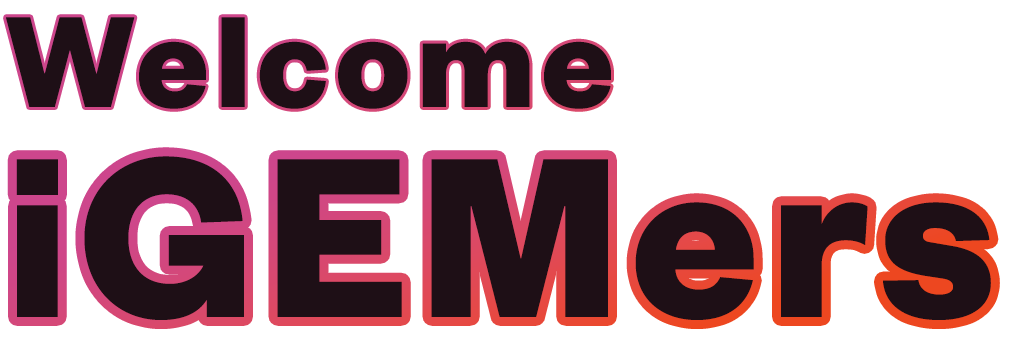
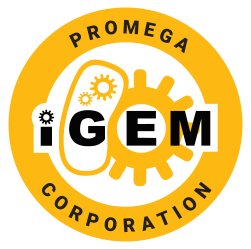
2024 Promega iGEM Grant Sponsorship Now Open!
Apply today and open up new opportunities!
Applications close May 31, 11:59 P.M. CDT.
About the Promega iGEM Grant Sponsorship
We are proud to award ten iGEM teams $2,500 each in Promega products to help support their bold ideas and pursue solutions to some of the most challenging and pressing scientific problems of today.
Explore Resources for Your Research, Lab and Career
Featured Webinars
Tips for Creating & Presenting Scientific Posters
Want your poster to stand out at the Giant Jamboree? Learn how you can make the most of your scientific poster presentation.
Crash Course Q&A
Learn tips and tricks from Promega scientists about ligation, site-directed mutagenesis and cloning as they answer questions from iGEM teams.
Advanced Techniques Q&A
Our panel of technical experts answer questions from iGEM teams about advanced techniques, including CRISPR.
Featured Resources
Helpful Video Guides on YouTube
Check out our YouTube channel for helpful videos on cloning, common experiment setups and running gels.
Top Ten Tips for Successful PCR
Your PCR run can almost always be better. Optimizing your protocol and following these steps could save you time, energy and the embarrassment of having to start over.
Successful Ligation and Cloning of Your Insert
Now that you've amplified your insert, the next step is getting it in the right place. This blog offers tips for making that happen.
BioMath Calculators
From DNA molarity to temperatures, the BioMath Calculators are lifesavers when it comes to unit conversions.
Featured Blogs
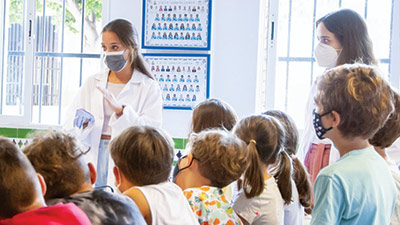
iGEM Malaga: Recycling Waste Olive Oil into Paint for Kids
A team from the University of Málaga tries to use microorganisms to transform dull, yellow-brown waste olive oil into rainbow-hued children’s paints.
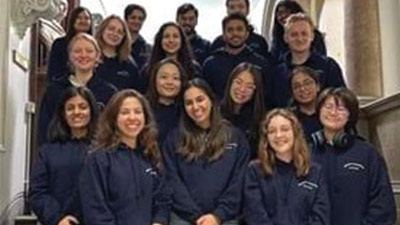
iGEM Team Explores Regenerative Spinal Cord Treatment with Promega Support
Both new and old team members from KCL sought to expand their research at the intersection of regenerative medicine and synthetic biology.
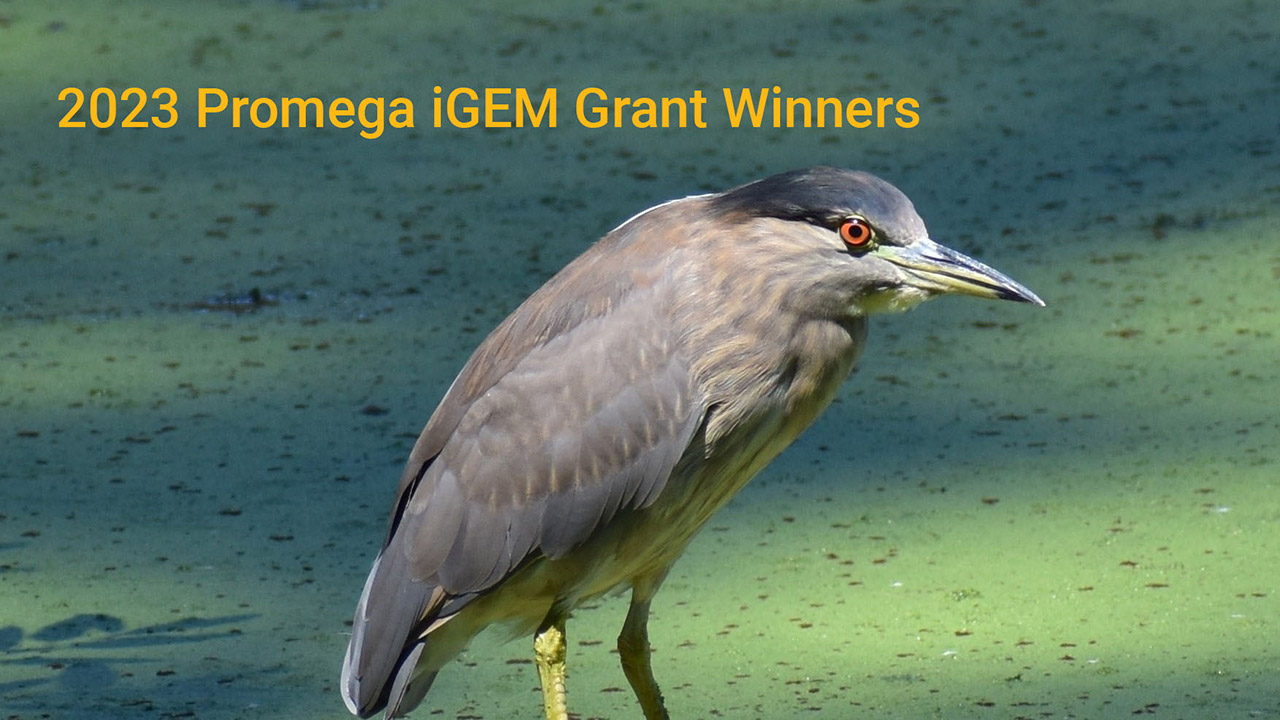
2023 Promega iGEM Grant Winners: Tackling Global Problems with Synthetic Biology Solutions
From creating a biosensor for detecting water pollution to solving limitations for CAR-T therapy in solid tumors, the teams are asking tough questions and providing thoughtful answers.
Previously Sponsored Teams
Lethbridge_HS
“The goal of our project is to create a glucose-dependent self-amplifying mRNA complex that codes for the human insulin gene.”
Rochester 2022
“In order to solve the problem of “buddy” syrup, we developed an approach that tests for three separate compounds present in higher concentrations within buddy sap: asparagine, sarcosine, and choline.”
Hopkins
“To address disordered roots in space, we will modify plants to mimic the innate gravitropism pathway with engineered magnetotropism.”
UAM
“We aim to design a biopesticide to control Coleopteran pests in Mexico using a holistic perspective by implementing an Integrated Pest Management.”
iGEM Montpellier
“We want to develop a detection device for the most present pathogens in the Thau lagoon: the algae A.catenella (which is harmful for humans) and the virus OshV-1 (which is the most important oyster pathogen and harmful for oyster).”
EPFL IGEM Team 2022
“We decided to produce our own sustainable insulative material to fulfill the future needs outlined by the UN 2030 Agenda for Sustainable Development Goals.”
UniofBath
“As growing population, changing diets, climate and energy shocks drive up prices, the world needs a reliable and affordable source of phosphorus, we aim to close the loop, curbing losses of valuable phosphorus from wastewater.”
IIT_Roorkee
“We aim to design a point of care kit for the detection of the most oncogenic strain of Human Papillomavirus, HPV16.”
IISc-Bengaluru
“We aim to design a bioreactor that can degrade hydrochlorofluorocarbons (HCFCs) and hydrofluorocarbons (HFCs) using a consortium of P. putida and E. coli, both engineered to metabolise the gases efficiently.”
CU_Egypt
“Our Alzheimer’s treatment triggers a new sustainable and effective system for targeting the misfolded protein, including the usage of biodegradable and sustainable nanocarrier containing our fusion protein to deliver it to blood-brain barrier.”
Ecuador
“We are developing Agro Bactory 593, a versatile multi-target platform in which, by changing the dsRNA target, we can fight against different pathogens.”
FCB-UANL
“We will attempt to produce three components that will make up the first-ever synbio-based firefighting foam.”
IISER-Bhopal
"We plan to engineer Bifidobacterium longum to secrete tumor-specific apoptosis-inducing peptides in the hypoxic tumor environment.”
IISER-Kolkata
"We hope to create a novel in situ method of detecting subclinical bovine mastitis, as well as cure the mastitis without the use of antibiotics.”
KCL
“We are working towards furthering our work from last year by developing a novel therapy for the treatment of cervical spinal cord injuries.”
Michigan State University
“Our team plans to develop a robust, adaptable biocontainment platform in the hopes of offering an accessible option for horizontal gene transfer prevention.”
St. Andrews
“We aim to develop Shinescreen, the first sustainable, environmentally friendly, probiotic sunscreen.”
TU Eindhoven
“We aim to develop a non-invasive technique for the diagnosis of Inflammatory Bowel Disease.”
UMA_Malaga
“We will develop a bioprocess to transform waste cooking oil into kits for making biopaintings, within a frame of a circular bioeconomy.”
UZurich
“Instead of attacking the pathogens as pesticides do, we want to support the plant’s own immune response in an effort to protect itself.”
BUGSS
“Our project will engineer cyanobacteria to transport iron into cells and reduce it to the bioavailable Fe(II) form.”
Calgary
“We plan to genetically modify Rhodotorula glutinis to be more robust and resource-efficient as a solution to Vitamin A Deficiency.”
Concordia - Montreal
"We are eager to design a solution to ensure the future of in-space biomanufacturing and exploration.”
King's College London
"The scientific community has been unable to provide an effective, inexpensive, and non-invasive treatment for SCI. We believe that needs changing.”
KU Leuven
KU Leuven received 2020 sponsorship by winning the scavenger hunt at the 2019 Giant Jamboree. Unfortunately, KU Leuven had to withdraw from the 2020 iGEM competition.
Qdai
“In order to solve phosphorus pollution and depletion, we use E. coli bacteria that is designed to have an increased capacity of phosphorus accumulation.”
Technion - Israel
“We plan to develop a novel hydrogel-based skin-screen containing proteins to block infection of host cells by SARS-CoV-2.”
Tuebingen
“To reduce heavy metal poisoning in the environment, we plan to use Riboswitches for detection and phytochelatins for absorption and clearance of Manganese.”
University of Copenhagen
“We are developing a non-invasive monitoring device for patients with Chronic Inflammatory Diseases by engineering yeast to sense inflammatory biomarkers in human sweat.”
UAlberta
"We aim to provide a comprehensive solution by developing an automated field diagnostic system specific to N. ceranae to work in tandem with the treatment we made last year."
iGEM Bonn
"Our goal is to engineer plants to create ambient light through efficient naturally occurring bioluminescence systems."
Cairo University
"Reducing the concentration of salts in the water, especially NaCl, is our main objective."
MSP-Maastricht
"Team MSP aims to broaden the spectrum of surface receptors available by creating a synthetic genetic system which evolves new receptors capable of binding specific, user-defined molecular targets."
Northern BC
"The 2019 Northern BC iGEM Team will address the overdose crisis from a harm reduction perspective, creating an opioid sensor in Saccharomyces cerevisiae that can be used to test non-opioid recreational drugs for opioid contamination prior to consumption."
NUS Singapore
"We plan to extend the exponential phase of bacteria by making them undergo a 'sleep-wake' cycle, controlling the nutrient uptake rate of the bacteria and so extending the overall protein production window."
Sao-Carlos Brazil
"To produce food on a planet as extreme as Mars, we plan to apply synthetic biology tools to engineer a fermenting yeast that is able to amass melanin on its surface to become resistant to ultraviolet radiation."
iGEM Sorbonne Université
"We want to create an alternative way of producing palm oil in a green alga named Chlamydomonas reinhardtii."
Victoria Wellington
"Our goal is to produce a battery that is efficient, safe, and sustainable. Our contribution to renewable energy storage will be to improve an existing glycerol fuel cell."
NYU Abu Dhabi
"The NYUAD iGEM team aims to create a multiplex, affordable, modular, and flexible wearable device that can simultaneously and rapidly screen for multiple food and viral pathogens."
Edinburgh OG
Project Name: Valeris.ED: Bio-based and biodegradable thermoplastics production by Escherichia coli with heterologous polyhydroxyalkanoate (PHA).
iGEM NYU Abu Dhabi
Project Name: Pathogene: A portable, low-cost, microfluidic lab-on-a-chip based device for rapid detection of multiple foodborne pathogens.
Makerere Uganda
Project Name: Plastic biodegradation
Read feature article: How Can Synthetic Biology Help Us Grow?
Manchester
Project Name: Man-Cheester: Development of Listeria monocytogenes biosensor for use in cheese starter cultures
TecMonterrey GDL
Project Name: Lactobachill: A smart psychobiotic with anxiolytic and antidepressant properties
Having trouble with a project?
Ask an Expert
Having issues with an experiment? Not sure which assay will give you the answer you’re looking for? Want to know more about a technique? Our Technical Support Scientists are here to help!
